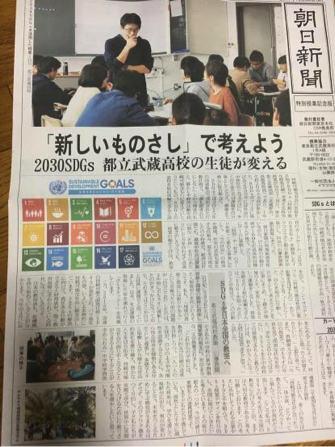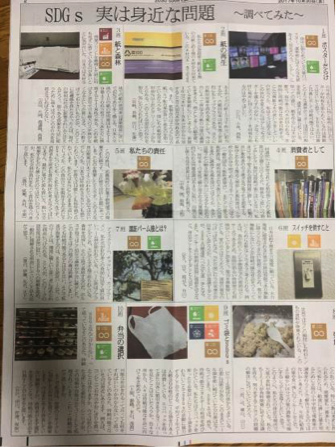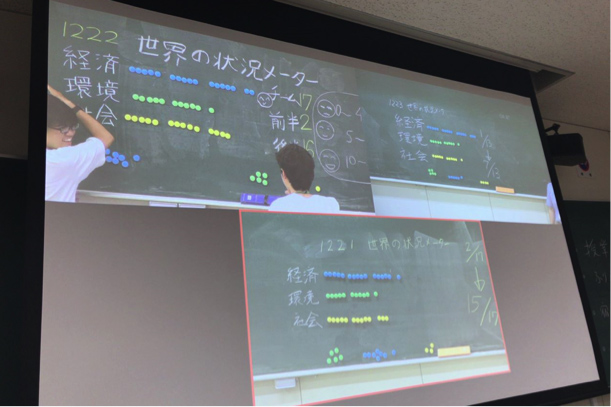CASE STUDIES
BUSINESS
- Organization
- Hitachi Capital Corporation
- Industry
- Social Infrastructure, Eco- and Energy- Related, Vehicle, Local Governments/Public Sector
- Volume of business
- 25 billion USD (Year ended March 31, 2018)
- Number of employees
- 5,390 (as of March 31, 2018)
- Number of participants
- 37 top executives including CEO
- Contents
- SDGs & creating social value
- Comments
- Hitachi Capital CEO, executives, and overseas regional heads gathered for a half day training featuring the 2030 SDGs Game. After the training, the company launched a new investment on social business and NGO collaboration.
- Organization
- Unilever Japan
- Industry
- Consumer goods company
- Number of employees
- 169,000 (2017, worldwide)
- Number of participants
- 37 top executives including CEO
- Contents
- SDGs & creating social value
- Comments
- Hitachi Capital CEO, executives, and overseas regional heads gathered for a half day training featuring the 2030 SDGs Game. After the training, the company launched a new investment on social business and NGO collaboration.
- ORGANIZATION
- Sompo Japan Nipponkoa Asset Management, Japan
- INDUSTRY
- Finance (one of the leading asset management companies in Japan)
- NUMBER OF EMPLOYEES
- 164 (as of April 2018)
- NUMBER OF PARTICIPANTS
- All the employees, about 50 participants, 3 times
- CONTENTS
- Business and SDGs with 2.5 hours training
- COMMENTS
- This training was targeted to improve the knowledge of those of employees who are not related to ESG/SDGs investment and unfamiliar with the SDGs.
- Organization
- Toppan Printing Co., Ltd. Japan
- Industry
- Printing, Information & Communication, Living & Industry, and Electronics segments.
- Number of employees
- 51,210(as of end of March 2018)
- Number of participants
- 20-30 participants each time
- Contents
- Events at Innovation Lab
- Comments
- This event has been held several times at their WAO open space, a venue intended to foster innovation. Customers and sales representatives collaborate to reach new solutions using the 2030 SDGs game event as a tool to expand their thinking to go beyond their existing limits.
- ORGANIZATION
- Hitachi Ltd, Japan
- INDUSTRY
- Consumer -electronics retailer (multinational conglomerate)
- NUMBER OF EMPLOYEES
- 303,887 (2017, worldwide)
- NUMBER OF PARTICIPANTS
- 150 at a time
- CONTENTS
- Employees across all departments attended games as part of compulsory CSR training.
- COMMENTS
- In general, around 50 people attend this kind of training, however, an announcement saying “You can learn about world trends by playing the 2030 SDGs Game.” brought 150 curious people to one event.
(Note: For each single game kit, 50 participants can play at the same time. If there are more than 50 participants, a second game kit is used to run the game, making two “worlds” at the same time. This event actually required one facilitator to lead the game using three game kits to run three different “worlds” at once.)
- ORGANIZATION
- Fuji Xerox Co., Ltd. , Japan
- INDUSTRY
- Managed Print Services, Communication & Business Process Outsourcing
- NUMBER OF EMPLOYEES
- 44,596 / 8,023 (consolidated / unconsolidated, as of March 2018)
- NUMBER OF PARTICIPANTS
- 130 at a time
- CONTENTS
- Creating new value through the SDGs
- COMMENTS
- The event was introduced to employees working together for one year on project teams for their “Virtual Hollywood Platform” project. After the event, some groups came up with new plans, revising their projects from the perspective of SDGs.
- Report
- https://imacocollabo.or.jp/company-case/2017-11-9/ (Japanese only)
- ORGANIZATION
- Japanese IT company, Japan
- INDUSTRY
- Data communication and system integration
- NUMBER OF EMPLOYEES
- Over 100,000
- NUMBER OF PARTICIPANTS
- 20
- CONTENTS
- Leadership version 3.0 – Creating vision by increasing personal commitment related to the SDGs
- COMMENTS
- It is essential to increase the impact of individual leadership to achieve a goal and create a vision related to the SDGs.
This training camp includes 3 topics: (1) Widen our personal worldview (2) Extend our horizons in order to collaborate within the organization, and (3) Grow in self-assessment to increase our sense of self-responsibility - Report
- https://imacocollabo.or.jp/company-case/leadership-1/ (Japanese only)
- ORGANIZATION
- Japanese manufacturing company
- INDUSTRY
- Comprehensive heavy-industry manufacturer
- NUMBER OF EMPLOYEES
- 29,706 (as of March 31, 2018)
- NUMBER OF PARTICIPANTS
- 30
- CONTENTS
- Corporate mid-term business planning training
- COMMENTS
- The 2030 SDGs game was used as the first training of a 6month corporate mid-term business planning training for next-generation executives. This enabled them to understand what kind of societal and environmental issues they will have to deal with.
What are people saying about the game?
see Voices of participants who have experienced the SDGs game.
SCHOOLS
- School
- Nagatadai Elementary School
- Ages
- 10-11
- Number of participants
- 35, 3 times
- CONTENTS
- Workshop to consider sustainability
- COMMENTS
- Minimum age of players in the event was around 10 years old, since the 2030 SDGs Game requires a conceptual understanding in order to be able to connect the game with the real world.
(Note) A simplified Kids version of the game is available (in Japanese only at this time)
- School
- Momoyama Gakuin University
- Ages
- 18-24
- Number of participants
- 50
- CONTENTS
- Business Plan Competition & SDGs
- COMMENTS
- Game was held for students participating in a Business plan competition sponsored by the university. After the event, participants began to incorporate SDGs goals into their business plans.
- School
- SENZOKU GAKUEN Junior & Senior High School
- Ages
- 13-14
- Number of participants
- 40
- CONTENTS
- Sustainability program
- COMMENTS
- Some visible effects were seen after the program, such as students starting volunteer activities.
- School
- St. Margaret’s Junior & Senior High School
- Ages
- 16-17
- Number of participants
- 150 at a time
- CONTENTS
- Sustainable development learning
- COMMENTS
- Their first game experience was well received. since they have decided to conduct the SDGs game in class every year, the school decided to send several teachers to become certified facilitators.
- School
- Tokyo Musashi Public High School
- Ages
- 15-16
- Number of participants
- 40
- CONTENTS
- SDGs game class turned into newspaper articles
- COMMENTS
- The Asahi Shimbun newspaper, one of the largest newspaper companies in Japan, and Imacocollabo, developer of the 2030 SDGs Game, began a joint project using original newspaper print for the 2030 SDGs game program for the high school.
The process was as follows: First, high school students experience the card game, writing articles based on their experiences; then Asahi creates an original newspaper for them; then, the students share the newspaper with their family and friends. This project has been sponsored by companies who paid advertisement fees to promote the sustainable project.


- School
- Setsunan University
- Ages
- 18-20
- Number of participants
- 333 (111 at a time (37 participants x 3 locations), 3 times consecutively)
- CONTENTS
- All freshmen in the faculty of liberal arts course (333 students) via online
- COMMENTS
- One facilitator conducted the 2030 SDGs game via an online video system to 3 different locations at the same time. There were game kits and student assistants supporting the game at each location.

What are people saying about the game?
see Voices of participants who have experienced the SDGs game.
GOVERNMENT
- Government
- Yokohama City office, Kanagawa Prefecture, Japan
- Number of participants
- 43
- CONTENTS
- Internal training
- COMMENTS
- Participants were the staff at the Environmental Planning Bureau. One participant commented after the event, “I was able to understand the necessity and value of the SDGs very easily and quickly—I thought I knew this already, but was surprised to discover that I actually had not understood at all.”
- Government
- Ministry of the Environment, Japan
- Government
- Ministry of the Environmental, Japan
- Number of participants
- 45
- CONTENTS
- Learn from experience -Sustainable society and 2030 SDGs game-
- COMMENTS
- Learning from experience -A sustainable society and the 2030 SDGs Game-
Comments: This ministry has been searching for 20 years for ways to contribute to solving social issues by engaging both economic rationality and environmental issues; however, the new guidelines of the SDGs have become a new guiding principle. As a result, it is expected that the environment and economy will grow together. The Secretary of the Ministry of the Environment commented that they should work proactively to achieve the SDGs goals. - Report
- https://imacocollabo.or.jp/municipality-case/report_20170125/ (Japanese only)
- Government
- Ministry of Education, Culture, Sports, Science and Technology, Japan
- Number of participants
- 40
- CONTENTS
- Understanding the connection between SDGs and Education by understanding the essence and outline of the SDGs
- COMMENTS
- Our aim is to understand the necessity of the SDGs and what the opportunities are created by having SDGs in the world. It was a training where all participants were able to create a vision for each of their areas of concern, and had an opportunity to consider a vision for education in future.
- Government
- Ministry of Agriculture, Forestry and Fisheries, Japan
- Number of participants
- 20
- CONTENTS
- Employees who work in the Biomass Circulation Resources Division and Food Industry Bureau
- COMMENTS
- To deepen knowledge of the SDGs
- Government
- Toyota City Office, Aichi Prefecture, Japan
- Number of participants
- 64 (in total)
- CONTENTS
- Internal training to learn their mission which is related to the SDGs
- COMMENTS
- The training was split into two sessions, morning and afternoon, so that all employees working for the Environment Department, Environmental Policy Division were able to join.
- Government
- Sabae City Office, Fukui Prefecture, Japan
- Number of participants
- 45
- CONTENTS
- Both city staff and citizens of Sabae City attended a kick off meeting to discuss their becoming a Sustainable City role model.
- COMMENTS
- Sponsored by Sabae City O It has been 20 years since ffice and two NPOs. The event was highly regarded and it is being held on an ongoing basis.
- Report
- https://imacocollabo.or.jp/2030sdgs-voice/20180104_sabae/ (Japanese only)
What are people saying about the game?
see Voices of participants who have experienced the SDGs game.
COMMUNITY
Community
The 2030 SDGs Game is being brought to all kinds of communities. The number of participants is increasing rapidly in Japan as the number of certified facilitators increases. In 2018, there were over 15,000 participants in Japan. The game operates on many levels and in many contexts, such as learning about the SDGs, what is a sustainable society, environmental and social issues, gender equality, refugees, future communities, creating a vision, team building, leadership development, and so on.

